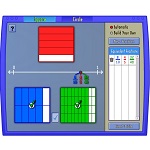Math can be a very difficult subject for some students to
grasp. In order for students to gain critical thinking skills for problem
solving, students need to acquire fluency and conceptual understanding. Manipulatives
are a great way to help students, especially students with learning disabilities,
gain understanding on abstract concepts. Do you have hands on manipulatives at your school? NO. DON'T WORRY, below is a list of great resources
that will help students gain understanding on different math concepts using virtual manipulatives. Click the links to give them a try!
Take a look at the National Library of Virtual Manipulatives
maintained by Utah State University. This resource bank allows users to access
materials based on category: numbers and operations, algebra, geometry,
measurement, and data analysis.
Illuminations, a website created by the National Council of
Teachers of Mathematics, offers a variety of online activities that will help
students understand different math concepts. One virtual manipulative they
offer is BASE TEN BLOCKS, which helps students “see” the regrouping strategy. Here is a picture of a manipulative from the website for equivalent fractions.

Computing Technology for Math Excellence provides a list of
virtual manipulatives for teachers and parents.
Internet 4 Classrooms is a FREE website that offers internet
resources to teachers to use in the classroom or resources to parents to
reinforce topics at home.
Math Playground offers math games, logic puzzles, and word
problems. The word problems will provide the student’s feedback after each
step.
Conceptua Math will
help supplement your lesson planning on fractions. This resource will speak the
text to students who struggle with reading or who are English Language
learners.
Destination Math from Houghton Mifflin Harcourt Learning Technology uses animation and speech output to keep
students engaged in the math concepts. This resource is also available in
Spanish for our English language learners.
Reference: Dell, A., & Newton, D. (2008). Assistive
technology in the classroom: Enhancing the school experiences of students with
disabilities. Upper Saddle River, N.J.: Pearson Merrill Prentice Hall.
No comments:
Post a Comment